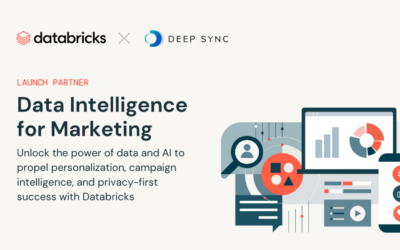Most businesses only leverage about 37 to 40 percent of their available data, leaving the majority unused. With so much data left on the table, there is a massive opportunity for companies to leverage more of their first-party data (also called 1pd or 1p data)—and gain a competitive advantage in the process.
Given the ever-increasing ways to use data to inform business decisions and marketing initiatives, companies are turning to enterprise data management to improve operations. Let’s explore enterprise data, how it impacts businesses, its benefits, and best practices to maximize efficiency.
What Is Enterprise Data?
Enterprise data is all the information that is shared across an entire organization. When managed properly, this data holds the key to companies’ success.
No matter your organization’s size, data helps you streamline business processes, improve data quality, and protect your organization’s valuable information. It is also crucial for marketing teams, who rely on this data to launch new campaigns, develop new products, and generate sustainable growth.
Customer relationship management (CRM) and enterprise resource planning (ERP) systems aren’t enough for proper enterprise data management. Instead, proper enterprise data management includes:
- Data integration — There are consistent formats, access, and processes for handling data.
- Accuracy and reliability — Data is free of disparity, errors, and redundancy. Data modeling and management strategies also meet standardized requirements.
- High-quality — Organizational standards include regular data hygiene processes to validate the quality of internal and external data.
- Scalable — Processes, standards, and integration must be flexible and scale to satisfy growing business needs.
- Robust security — Cybersecurity policies and technology are expertly deployed to secure valuable data.
Current, accurate, and reliable data leads to quality business decisions. So, you can maximize profit by implementing enterprise data management solutions in your organization.
The Role of Enterprise Data in Today’s Landscape
Businesses rely on data for every department, from finance to customer service to marketing. However, without adequate enterprise data management, that data is less usable and poses a greater security risk.
According to research, poor data quality costs $12.9 million annually, on average. This can also contribute an average of four extra IT hours per week to resolve preventable issues.
Proper enterprise data management can reduce wasted resources and keep data actionable. A reputable data partner, like Deep Sync, can help enterprise-level companies manage, update, transform, and activate their customer data, especially for marketing purposes.
Some companies choose to clean and update their data in a privacy-safe, clean room environment, enlisting native applications from a data cloud provider like Snowflake. This allows businesses to manage their data with an extra layer of privacy-enhancing technology.
Enterprise data—with proper integration, quality, scalability, and security—aids business intelligence and analysis. Once data is properly stored and managed, businesses can incorporate machine learning (ML) and artificial intelligence (AI) to uncover trends.
Businesses leverage ML and AI to help extract information that tells a greater story. With detailed enterprise data analytics completed by these complex algorithms, decision-makers and stakeholders can make informed decisions based on actionable insights provided by this analysis.
Deep analysis of your enterprise data, with the help of modern technology, can be extremely informative. You can evaluate everything from financial data, like transactions, to strategic data, like hiring and turnover trends, to make informed decisions with the most current information possible.
The Benefits of Proper Enterprise Data Management
Implementing enterprise data management strategies comes with far-reaching benefits that will have a company-wide impact. Your data becomes easier to locate, manipulate, share, analyze, and synchronize between departments in your organization.
By storing your enterprise data in a secure location, whether in dedicated on-premises solutions or cloud-based architecture, you can witness additional benefits, such as:
- Readily available and controlled access to secure, accurate, and reliable data for business analysis and decision-making.
- A consistent and scalable data management system that grows and scales with your business.
- Consolidate and centralize data from multiple sources to prevent data silos, duplicate records, and errors.
- More robust data security, especially with controlled data access, user validation, and regulatory compliance.
Enterprise data management relies on the intersection of people and technology to be most effective. So, it’s important that different departments are informed about best practices.
Enterprise Data Management Best Practices
Enterprise data management includes the database administrators, IT teams, or project managers working with leadership to manage information throughout its lifecycle. These individuals manage documentation and direct data flow while following established procedures for the overall data hygiene process.
Additionally, there needs to be someone responsible for data stewardship. This person undertakes master data management, like maintaining master files. A best practice is to have a clear succession plan so data assets remain safe, even if the data steward leaves the organization.
Although dedicated teams or individuals carry the brunt of enterprise data management, data governance is everyone’s responsibility. From C-suite leadership to frontline employees, here are some best practices for enterprise data management you can implement:
- Obtain C-suite buy-in and make data security, management, and governance a top priority in your business.
- Establish a data governance structure to ensure consistency, accuracy, and compliance with legal regulations.
- Train every team member on data management and corporate guidelines, emphasizing their impact on the organization if not followed.
- Institute a consistent data administration and governance maintenance schedule.
- Leverage modern technology to seamlessly integrate data into existing business systems to centralize information and improve access to appropriate teams.
- Install additional security measures and disaster recovery plans that engage immediately upon detecting a threat.
A partner with extensive data expertise, like Deep Sync, can help your organization create a strategy and routine process to clean, update, transform, and activate your customer data.
Seamlessly Manage Your Enterprise Data With Deep Sync
Enterprise data is all the digital information your business collects—from financial transactional data to changes in workforce, to supply chain exchanges, and everything in between. With so many data sources, an effective management system is vital for the security, accuracy, and reliability of your organization’s data.
Proper enterprise data management can help ensure there is high-quality data at your fingertips that allows you to make informed decisions. Don’t wait to get started with enterprise data management: Schedule a strategy session with Deep Sync today or browse our native applications in the Snowflake marketplace.












0 Comments